Through the Bible, we find examples of people who fasted at specific moments in their lives. Here is a short list of some biblical characters who fasted, how long they fasted, and the reasons they did so.
1. Moses
Moses was a great prophet and leader of the Jewish people. God chose him to deliver the people from slavery in Egypt and lead them to the Promised Land. God asked Moses to go up to Mount Sinai to receive the tablets of the law.
The Lord said to Moses, “Come up to me on the mountain and stay here, and I will give you the tablets of stone with the law and commandments I have written for their instruction.”
- Exodus 24:12
Moses understood the importance of that moment and the impact it would have on the people. Therefore, he fasted for 40 days and 40 nights. It was a special occasion: he would receive God's law for the people. He knew that God's presence would be on the mountain, and he fasted as a sign of humility before God's holiness and greatness.
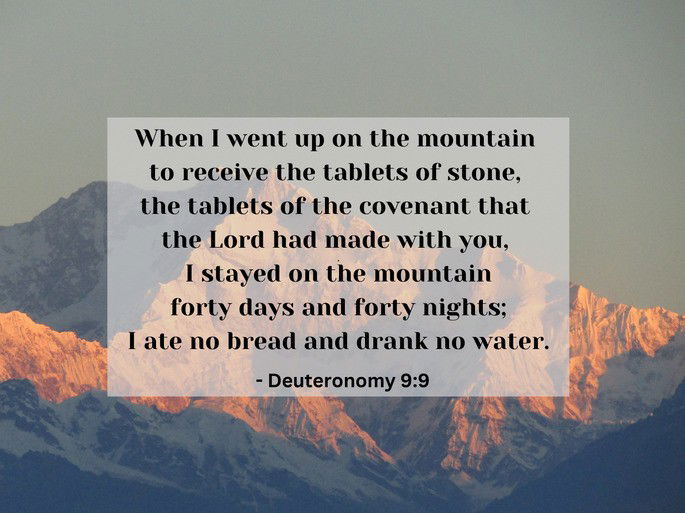
When I went up the mountain to receive the tablets of stone, the tablets of the covenant the Lord made with you, I stayed on the mountain forty days and forty nights; I ate no bread and drank no water.
- Deuteronomy 9:9
In Deuteronomy 10:10, we see that Moses fasted again for 40 days and 40 nights when he had to return to the mountain to receive the new tablets of the law.
2. David
David had failed God. He had committed adultery and indirectly had sent the husband of the woman he desired to be murdered. It seems that David had not repented before God. In 2 Samuel 12, we see that the baby born from this relationship had already arrived when Nathan, the prophet and friend of David, went to visit him.
Nathan told David a parable to confront him about his sin. David did not realize that the parable was actually about him. When he finished hearing Nathan, he declared: "As surely as the Lord lives, the man who did this deserves to die!" His eyes were opened when Nathan told him that he was the one in the story.
Then Nathan said to David:
“You are the man! This is what the Lord, the God of Israel, says: ‘I anointed you king over Israel, and I delivered you from the hand of Saul. I gave your master’s house to you, and your master’s wives into your arms. I gave you all Israel and Judah. And if all this had been too little, I would have given you even more. Why did you despise the word of the Lord by doing what is evil in his eyes? You struck down Uriah the Hittite with the sword and took his wife to be your own. You killed him with the sword of the Ammonites. Now, therefore, the sword will never depart from your house, because you despised me and took the wife of Uriah the Hittite to be your own.’
- 2 Samuel 12:7-10
It is at this moment that David realizes the magnitude of his sins and repents. He humbled himself before God and asked for forgiveness. Nathan told him that God had forgiven him, but that he would still suffer the consequences of his sin. The baby would die.
When David returned to his house, he was told that the child was seriously ill. David decided to fast. He did not eat during the 7 days the child was gravely ill. He pleaded with God for compassion, asking that He grant health and life to his son. However, the child died, just as God had said through Nathan.
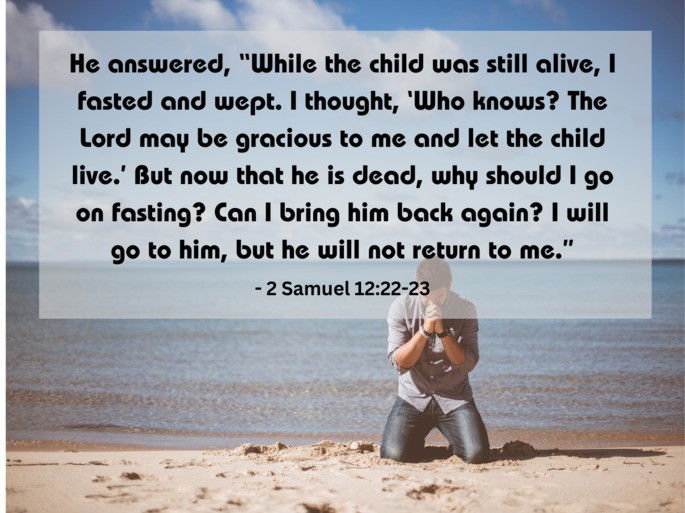
He answered, “While the child was still alive, I fasted and wept. I thought, ‘Who knows? The Lord may be gracious to me and let the child live.’ But now that he is dead, why should I go on fasting? Can I bring him back again? I will go to him, but he will not return to me.”
- 2 Samuel 12:22-23
3. Daniel
Daniel was a young Jewish man from a noble family. He was deported to Babylon along with other young men to learn the language, literature, and customs of the Babylonians. Daniel's strong convictions and great faith in God led him to refuse the king's food and wine.
He, along with three of his companions, requested a different diet that adhered to the dietary laws that God had given to His people. Even with this simpler diet, they appeared healthier than the other young men. Daniel and his companions not only enjoyed good health but were also very wise and had special gifts that God had given them.
Over the years, Daniel used these gifts, particularly his ability to interpret dreams, which led to his growing fame and caused some to reject and envy him. Daniel remained faithful to God and experienced great miracles of protection. In Daniel 3, we see how God protected him and his friends, saving them from dying in the fiery furnace.
Daniel feared God, studied His Word, and studied the prophecies. In Daniel chapter 9, he read the prophecy of Jeremiah about the seventy years of desolation of Jerusalem. The chapter begins like this:
In the first year of Darius son of Xerxes(a Mede by descent), who was made ruler over the Babyloniankingdom - in the first year of his reign, I, Daniel, understood from the Scriptures, according to the word of the Lord given to Jeremiah the prophet, that the desolation of Jerusalem would last seventy years. So I turned to the Lord God and pleaded with him in prayer and petition, in fasting, and in sackcloth and ashes.
- Daniel 9:1-3
Daniel read the prophecy and responded with prayer and fasting. He set aside a day to be in total humility before God. During this fast, he confessed the sins of the people of Israel to God and asked for mercy (Daniel 9:3-5; Daniel 10:2-3).
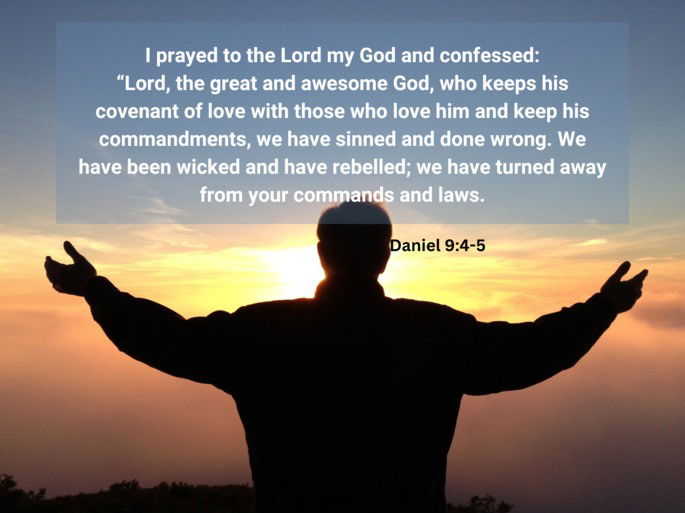
I prayed to the Lord my God and confessed:
“Lord, the great and awesome God, who keeps his covenant of love with those who love him and keep his commandments, we have sinned and done wrong. We have been wicked and have rebelled; we have turned away from your commands and laws.
- Daniel 9:4-5
On another occasion, Daniel fasted for three weeks with a partial fast from certain foods, and during this time, he had a vision.
At that time I, Daniel, mourned for three weeks. I ate no choice food; no meat or wine touched my lips; and I used no lotions at all until the three weeks were over. On the twenty-fourth day of the first month, as I was standing on the bank of the great river, the Tigris, I looked up and there before me was a man dressed in linen, with a belt of fine gold from Uphaz around his waist. His body was like topaz, his face like lightning, his eyes like flaming torches, his arms and legs like the gleam of burnished bronze, and his voice like the sound of a multitude. I, Daniel, was the only one who saw the vision; those who were with me did not see it, but such terror overwhelmed them that they fled and hid themselves.
- Daniel 10:2-7
4. The People of Israel
The people of Israel had been captive for seventy years, a time during which they had not had access to the word of God. They had lived immersed in another culture and had become accustomed to living and doing things differently than what God had commanded.
Upon returning to their land and beginning the reconstruction of the city, Nehemiah, who had been appointed governor, made sure to dedicate time to read the word of God. As the people read God's law, they began to realize the mistakes they had made.
In Nehemiah chapter 9, we see that they decided to fast. They set aside time to confess their sins before the Lord. This was a fast to recognize and confess their sins, to examine themselves in the light of the word of God.
On the twenty-fourth day of the same month, the Israelites gathered together, fasting and wearing sackcloth and putting dust on their heads. Those of Israelite descent had separated themselves from all foreigners. They stood in their places and confessed their sins and the sins of their ancestors. They stood where they were and read from the Book of the Law of the Lord their God for a quarter of the day, and spent another quarter in confession and in worshiping the Lord their God.
- Nehemiah 9:1-3
That time of fasting and reflection resulted in the confession of sins and worship of God.
Discover the 4 types of fasting mentioned in the Bible.
5. Esther
Esther had to intercede before the king to save her people, the Jewish people, from death. King Xerxes had conceded, at the insistence of Haman, a high-ranking official, and passed a decree requiring everyone to bow before Haman. But neither Mordecai nor the Jewish people were willing to obey. They would only bow before God.
Haman became very angry and sought to destroy the Jewish people. Mordecai asked Esther to intercede before the king on behalf of the people, as she was in a position that allowed her to do so. They decided to fast so that the king would look favorably upon Esther's approach. They knew that only God could soften the king’s heart and protect them from extinction.
In chapter 4 of the book of Esther, we see that she would fast for three days before going to see the king. She asked her maidservants, Mordecai (her cousin and adoptive father), and all the Jews in the city to join her. The urgency and importance of the matter required the commitment and effort of everyone.
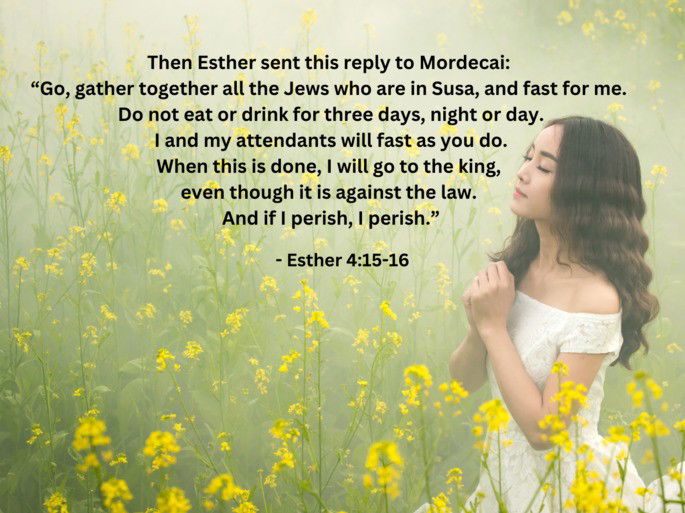
Then Esther sent this reply to Mordecai: “Go, gather together all the Jews who are in Susa, and fast for me. Do not eat or drink for three days, night or day. I and my attendants will fast as you do. When this is done, I will go to the king, even though it is against the law. And if I perish, I perish.”
- Esther 4:15-16
6. Jesus
Jesus Himself fasted. He dedicated 40 days and 40 nights to fasting in the desert. This was right after His baptism and before beginning His ministry.
He did not eat anything during that time. Why did He do it? Because He was preparing His spirit for the work that God the Father had entrusted to Him. We see that Jesus, although filled with the Holy Spirit and being God incarnate, knew how important it was to fast, strengthen His spirit, and be ready to carry out the work He had come to do.
Jesus, full of the Holy Spirit, left the Jordan and was led by the Spirit into the wilderness, where for forty days he was tempted by the devil. He ate nothing during those days, and at the end of them he was hungry.
- Luke 4:1-2
The devil took advantage of this time to tempt Jesus. But Jesus stood firm, and with the wise use of God’s word, He overcame all the temptations.
7. The Early Church
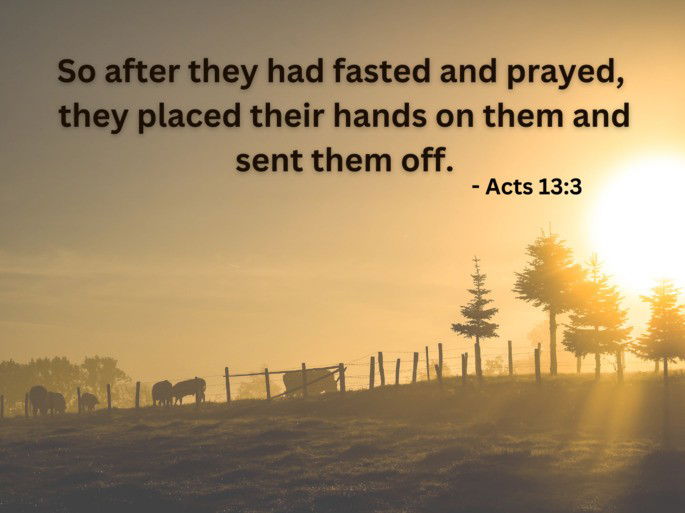
So after they had fasted and prayed, they placed their hands on them and sent them off.
- Acts 13:3
In the book of Acts, we see that the early Christians clearly understood the importance of fasting. They set aside time to pray and fast before making major decisions that would affect everyone. For example, before deciding whom to appoint as elders or whom to send to carry out a specific ministry.
They preached the gospel in that city and won a large number of disciples. Then they returned to Lystra, Iconium and Antioch, strengthening the disciples and encouraging them to remain true to the faith. “We must go through many hardships to enter the kingdom of God,” they said. Paul and Barnabas appointed elders for them in each church and, with prayer and fasting, committed them to the Lord, in whom they had put their trust.
- Acts 14:21-23
Now in the church at Antioch there were prophets and teachers: Barnabas, Simeon called Niger, Lucius of Cyrene, Manaen (who had been brought up with Herod the tetrarch) and Saul. While they were worshiping the Lord and fasting, the Holy Spirit said, “Set apart for me Barnabas and Saul for the work to which I have called them.” So after they had fasted and prayed, they placed their hands on them and sent them off.
- Acts 13:1-3
As we see in these examples, fasting can be complete or partial, lasting hours, a day, or several days, and can be personal or done in a group. What is important is having a clear purpose before God and knowing why we are fasting. And, of course, being prepared to receive something new and beautiful from our Lord. God never ignores those who seek Him!
You might also be interested in:
